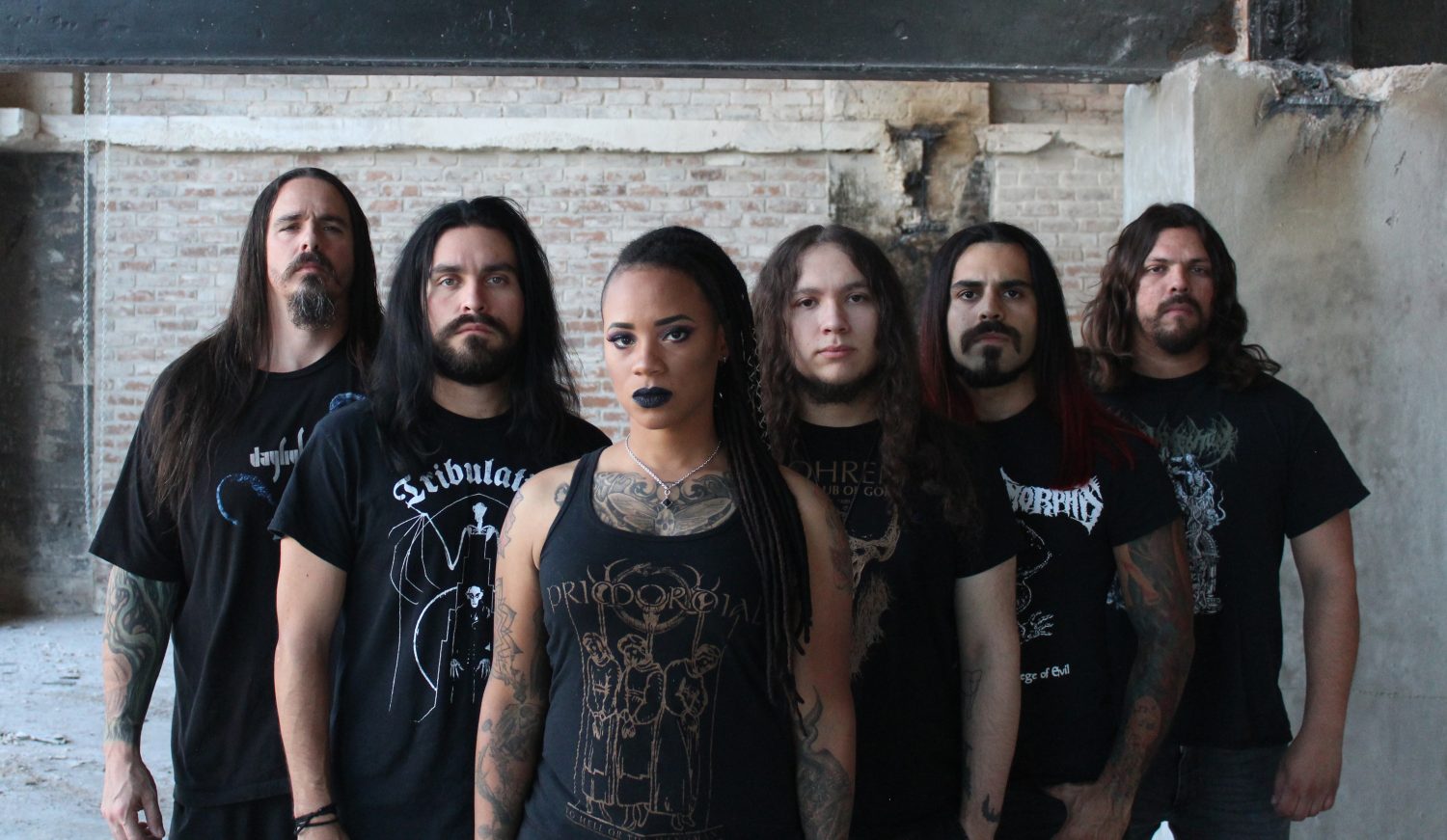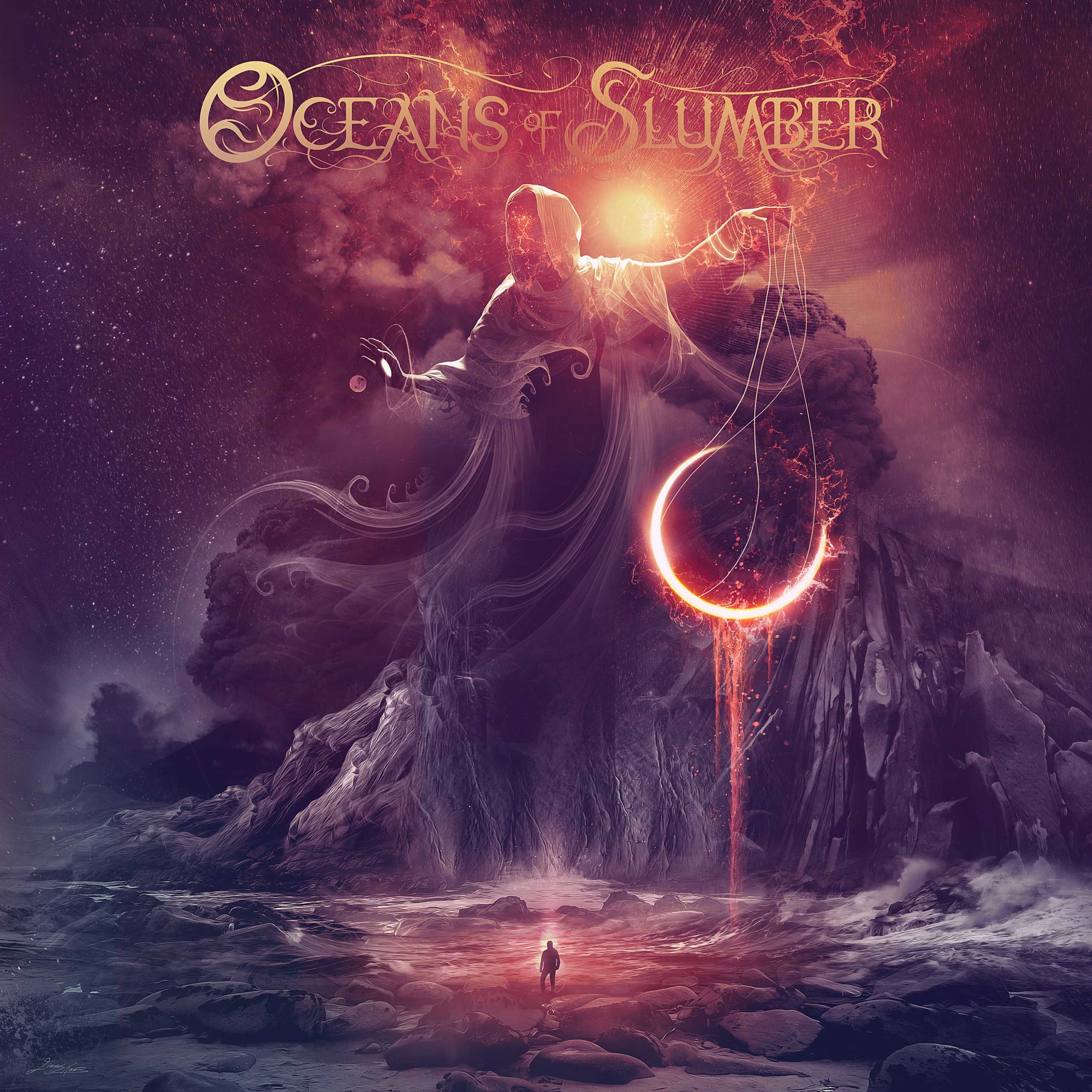Interviews
In Conversation with Oceans of Slumber: Dobber Beverly on the Self-Titled Album and Forming Emotional Connections with Fans (Part 1)

In what has been a challenging year for pretty much everyone, one positive aspect to take from 2020 is the stellar music that has continued to be released despite the difficulties in making every cog spin in advance of a release date. Fortunately for Oceans of Slumber, their new self-titled album, Oceans of Slumber (read our review here), released on September 4th via Century Media Records, had been completed pre-lockdown and, with the release of a number of new songs throughout the year to whet the appetites of the band’s increasingly devoted fan base, the Houston-based sextet’s fourth full-length is now available and has been receiving wide acclaim.
With a drummer and songwriter whose past endeavours would earn him in a place in the grindcore hall of fame, a vocalist whose stunningly soulful voice pushes the musicians to new heights with every release, and an entirely new rest-of-the-band lineup who have already impressed with their technical abilities and creativity, Oceans of Slumber’s latest release hints at a group who are full of confidence in their unique blend of death metal and doom, all of which is wrapped boldly in a swathe of dark, progressive countenance and wonderfully compelling vocal melodies.
“We like to call it ‘future music,’” says Dobber Beverly as I catch up with the band’s principal songwriter and drummer on a scorching Texan afternoon amidst a resurgent lockdown and an impending hurricane. “This could be my last interview ever,” he jokes as parts of the city await news of whether they’ll have to evacuate.
Dobber’s arrival into the band in 2011 was a more natural placement than some may think, having come from grindcore stalwarts Insect Warfare. “I was into, and doing, all of this kind of music and things adjacent to this style of music long before I ever played grindcore,” he explains. “I played death metal for ten years and then came the grindcore. I wanted to branch out into more songwriting-based things. I’ve written plenty of electronic music and classical-based scores to indie stuff… Insect Warfare was this crazy grindcore band. It’s almost like somebody who’d not seen me or read much on me would think that I was going to be some crust punk who just happened to be playing in a progressive metal band! The juxtaposition is obviously there if we’re only talking about these two groups, otherwise to me, grindcore was just another side of expression and Oceans of Slumber is the other side of that expression.”
With the arrival of vocalist Cammie Gilbert in 2014 came a new direction for the band and one that allowed Dobber to fully realize his creative ideas. “(Cammie) joining the band was the ultimate outcome of what it was anyway. When we started Oceans and we didn’t have a vocalist and were trying to find a singer, I wanted a female vocalist from the moment I heard The Gathering, and as a kid I knew that this was the kind of music I wanted to make – basically heavy music with a female vocalist,” he says as we discuss the band’s evolution since 2016’s Winter, an album that turned heads in no small part due to Cammie’s standout vocals. “So when she did get into the band, it wasn’t like ‘yeah let’s change some stuff up,’ it was more like, ‘now I can do what I want to do.’ Thankfully, the music that I write (and that we write collectively) falls right into place with her vocals. Aetherial (the band’s debut album) was a very complicated, all over the place, disjointed record. It was fun and it was cool but it was definitely a mismatch of thoughts.”
With Cammie on board, Dobber delves further into the evolution of his songwriting process over the course of the next three albums, including the stunning new release Oceans of Slumber. “Winter was kind of corralling that to a handful of songs that fit Cammie’s voice very well and then another handful of songs that were left over from that era. The Banished Heart was the next step up where three-quarters of the record was written with Cammie in mind, and by this (new) record it was transitioning to supporting her. It’s not like writing simple music so we can create a pop record,” he says, “it’s writing deep music with the intentions of supporting our vocalist. Make no mistake: I fully understand that she is the star of the band – it’s what I wanted anyway, so I’m happily in the spot of getting the right music that somebody like her can sing to.”

Artwork for ‘Oceans of Slumber’ by Oceans of Slumber
One thing that has continued to plague bands with female vocalists in recent years is the ridiculous stereotype of gender equating to genre and, with that in mind, I approach the subject with Dobber to get a feel for how difficult it can be to convince potential new fans to check out Oceans of Slumber’s music. “Of course it has (been difficult),” he says. “It’s been the bane of our existence, it’s almost impossible. A lot of people don’t understand that there are a lot of Emma Ruth Rundles and Chelsea Wolfes and Anna Von Hausswolffs out there. It’s an old-school outlook. It’s a boy’s club, ‘women aren’t allowed,’ it’s like, women aren’t allowed to create this kind of music – guys want women there but only in a particular role.”
He continues to explain that the band find themselves pigeonholed for marketing purposes, no matter how little sense it makes. “We have that all the time. I mean how close do we sound to a band like Epica? But in the marketing of our band we have to be marketed to people who like Epica. And that’s nothing against Epica, but it’s like, ‘hey, you’re a girl… and the band is judged upon genitalia regions!” We both agree that things are (hopefully) changing for the better, and he ends by providing a little insight into the meaning of the band name. “Luckily, it’s a small percentage of who comments on the things we do, so I’m happy about that,” he says. “Some of those same comments from those types of people are like, ‘Oceans of Slumber puts me to sleep,’ but the name of the band is meant to be something like ‘sea life’ or ‘cosmic’ in that lucid area. ‘An ocean of slumber,’ you know, it’s either death or it’s some cognitive way of being zen or some way of being at peace with yourself, or if the ultimate peace is death then that’s ‘oceans of slumber.’”
Along with the new album comes its self-titled moniker, a decision often made by bands for a specific reason, perhaps seeing the release as a defining moment for them and their sound. “It was two purposes,” he replies. “(Out of) the four of us who created the band, three of them stepped away, and we wrote a record that’s self-titled, so it’s a statement in that way. It’s (also) defining as the style for us (although let me ear-tag that as ‘at the moment!’). As of 2020, this is the record that’s definitive musically for what Oceans of Slumber is going forward. It’s also to say that despite who is (or isn’t) involved, Oceans of Slumber is uniquely its own entity. It’s a duality that the title exists. It’s almost to the point though to where you get into the Led Zeppelin naming,” he jokes, “where the next record is II and the following one is III!”
Speaking of the band’s new lineup, joining Dobber and Cammie post-The Banished Heart are guitarists Jessie Santos and Alexander Lucian, bass guitarist Semir Özerkan and keyboardist Mat Aleman, all of whom arrived in time to contribute to the new album. “Absolutely,” says Dobber. “Even songs that were completed or that I wrote fully… there’s still room for interpretation or for a spring clean or details. That’s where this record and the band is different, because everybody in the band is ideally on the same page, they want the same things that we want, and ultimately that makes the band ‘us.’” He continues to add that some of the songs were even written by the new arrivals. “It’s cool as hell, Jessie and Zan wrote a song apiece on the record and then they contributed to all the songs. ‘Soundtrack To My Last Day’ was written by Jessie and myself, it’s Jessie’s riffs with my direction. And that’s the thing, it fits perfectly. Zan wrote ‘Total Failure Apparatus’ and it was much in the same way, we changed a little bit of the arrangement, then everybody else is able to add their parts or atmospheres. It’s like ‘me’ acting as producer and ‘us’ acting as the writers.”
With 2020 being a write-off in many respects, getting things done, especially for a group of people who have been forced to stay apart, has been challenging to say the least. Luckily for Oceans of Slumber, the new album had been completed before the world went to hell in a handcart, meaning there were no real delays in its release. “We came back from Europe in August of last year and we already had a couple of demos and we sat down and we finished out the whole record – it took about six weeks I think to write and completely finish. Then we tracked it, and then Cammie did all her stuff, she did all her vocals in a month stretch, she wrote to the record. So the overall process was very rapid, but that’s how it works for us, it’s fast and off the cuff.” Continuing, Dobber explains that they’re lucky to have a group of people on board who can work at a fast pace. “You can sit and dwell over and try to cook up, or try to incubate, a song for years if you wanted to, or if you’re good enough at what you do, you can just kind of hit it and stick it from the get go. Thankfully, we’re all seasoned enough musicians and, for now, good enough at doing that easily.”
With an impressively swift album cycle that has seen the band release a new album every two years since 2016’s Winter, Dobber provides a nugget of information that will have fans slathering despite the new album having been released less than a month ago. “We pretty much already have another record finished now,” he teases. “Our record for next year is already written!” As to whether they can maintain such a swift album cycle… “At some point obviously you’re going to run out of ideas and start writing the same song though!”
With the lack of any current touring opportunities undoubtedly quickening the songwriting process for many bands, touring is of vital importance, not least due to the passion Oceans of Slumber have for playing live. “Well we wouldn’t be working so quickly if we had something to do(!) and that’s the problem with the shutdown, for a person like myself or Cammie, it’s devastating not to have a place to put this. We can release a record, it can do really well, it might chart on like the Billboard shit when it comes out, but that doesn’t do anything for us as artists. It’s awesome and cool, it’s an accomplishment, but the ability to play it live and to get out and see who it affects and what it does is what it’s all about.” He finishes with a blunt statement that is undoubtedly shared by the vast majority of musicians all over the world. “You take that away then what’s the fucking point in doing all this?”
With writing taking precedence, I state my hopes that live music will return in the not-too-distant future, but Dobber isn’t particularly optimistic. “I mean we’re not going to (go back to playing live soon),” he replies. “That’s the saddest thing, we’re still about a year away before tours are actually going to be happening again. That’s why we’re already writing new music. If we don’t take these restless feelings and put them somewhere, then you eat yourself from the inside out.”
The emotional connection between the band and the fans can be, especially in a live environment, particularly poignant. I ask him about the live experience and if the emotional energy is magnified between the band and the crowd. “Fuckin’ sure! It’s intense,” he says. “Some days are better than others, some days it’s just a song and some days it’s your life.” It can even be too much at times but, as Dobber explains, it can also be therapeutic. “When we played ‘No Color, No Light’ for the first… fucking hundred times(!), there wasn’t a time when Cammie could get through the song due to its attachment, but that’s what therapy is, you do and repeat the steps until it finally becomes… it’s like an addict saying, ‘I’m an addict, I’m an addict,’ repeat and repeat, and at some point you’re two years past that and you speak to yourself as in the third person. So with ‘No Color, No Light’ we finally got to a point where she could make it through and I could watch her make it through, it was something that I had to experience with her, knowing that she was going through something that intensely personal.”
This emotional purging can happen on both sides of the barrier, of course, and it’s something that remains important for Oceans of Slumber as it continues to play an integral part of their existence as a band. “There’s a point in which you come out the other side of all this and you can enjoy it and just play the song for what it is,” says Dobber. “Or then you’ll see someone in the front who’s fuckin’ scream-crying because of something you wrote and that can hit you, too. But it’s why we do this stuff, it’s why this band exists. It’s painful – it can be. Thankfully, this record isn’t full of that many things, I mean ‘To The Sea’ will be one of those songs that signifies so much to everybody in the band.”
With “To The Sea” not only being an album highlight but also an incredibly emotional song, Dobber explains how the video, despite containing deeply personal memories and images for the band themselves, will undoubtedly resonate on a personal level for anyone who watches it. “It was meant for that,” he explains. “We were actually going to open up the idea of including a few fans’ photos, but we already get overrun with people that relay stories and how the music that we write affects them and the catharsis that they’re offered. So it was like, let’s keep it personal, we’ll keep it within the band. That song was written directly about my own personal loss, and though however powerful and painful it was, it’s not anything that’s unique, like I’m not the only person to lose something so close, so that’s where the human connection is. It’s like you, or somebody you know might have had a far worse experience, but they had no way to express that. I’m lucky enough to be a creative musician that does this, this is what I do, so if I can offer my mild amount of expertise in relating the same thing that you can also latch onto, then I’m happy to do that. It’s literally what I want to do, it’s like the empathy in the world and the things around us.”
With the new album comes a slight shift away from the intensely personal subject matter that defined previous album The Banished Heart, although as Dobber explains, the emotional connection remains a key aspect of the songwriting process. “This one is more of a reflection outward of thoughts and stimulus around us and it’s a lot less about what we’re directly going through together or individually,” he says. “This record doesn’t have as much heartbreak – it has introspective moments, it has heartache (like on ‘The Colors of Grace’ and ‘To The Sea’), but it’s about processing things that are around us and not necessarily about things that we’re going through. The Banished Heart was a direct output of trauma and this (new album) is more of a collection of thoughts about trauma.”
Further discussing the songwriting process and how personal experiences translate so naturally and effectively through direct creative channeling of an individual’s thoughts and feelings, Dobber reiterates his sense of responsibility in using his creative talents to help others. “Well it does (translate well), and it goes back again to what I was saying about feeling fortunate that some people have a lot of trauma and a lot of really deep things that would work themselves out incredibly well in writing literature or in music, but they don’t have the tools or abilities to translate that, and I feel… for one I feel bad that people don’t have a place to put some of these things, and for two I’d feel bad if I didn’t use my ability (or other bands use their ability), you know, that’s what they’re for.”
Commenting on the fickle nature of the music industry, he clearly feels fortunate to be doing what he’s doing but understands it could end at any time. “It’s also damning to us, we write something so incredibly personal, and that doesn’t translate to sales… music is a business and so we’re fighting ‘sales’ vs. ‘heart,’” he says. “We’re in a fortunate position to be where we are, but we don’t know how long that lasts!” With the release of their fourth album proving that the band’s run of form shows no sign of slowing down, the increasing number of fans are hoping that Oceans of Slumber will be around for many years to come.
Many thanks to Dobber for his time.
In part two of our conversation, we discuss compositions and interludes, cover songs and musical influences, as well as the influence of fall and nature in the band’s music.
-

 Alternative/Rock6 days ago
Alternative/Rock6 days agoThe Warning Shake the Foundations of a Sold-Out Leeds Stylus [Photos]
-

 Music2 weeks ago
Music2 weeks agoTake That (w/ Olly Murs) Kick Off Four-Night Leeds Stint with Hit-Laden Spectacular [Photos]
-

 Alternative/Rock6 days ago
Alternative/Rock6 days agoThe V13 Fix #011 w/ Microwave, Full Of Hell, Cold Years and more
-

 Alternative/Rock2 weeks ago
Alternative/Rock2 weeks agoThe V13 Fix #010 w/ High on Fire, NOFX, My Dying Bride and more
-

 Features2 weeks ago
Features2 weeks agoTour Diary: Gen & The Degenerates Party Their Way Across America
-

 Indie6 days ago
Indie6 days agoDeadset Premiere Music Video for Addiction-Inspired “Heavy Eyes” Single
-

 Folk7 days ago
Folk7 days agoKatherine Perkins Strikes the Right Tone with Her “Hold On” Music Video Premiere
-

 Country1 week ago
Country1 week agoBrooke Ashton Chats About Her “Someone” Single, Creative Process, and More!













